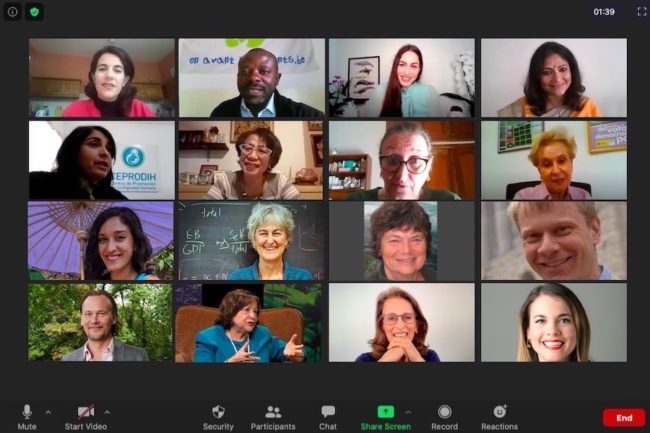Care and Education – Cornerstones of sustainable and just economies
04.07.20
UN New York, HLPF - Invitation to a virtual side-event to the 2020 High-Level Political Forum on 16 July

![]() MMM HLPF 2020 Side-event Flyer for download
MMM HLPF 2020 Side-event Flyer for download
When and Where
- 16 July 2020 – 8:00-9:30 EDT / 14:00-15:30 CET
- Virtual event using Zoom Webinar – Registration compulsory on https://bit.ly/2YZe8PD
(The event will also be live-streamed on our Facebook page)
Our objectives
- Spotlight the failings of our current economic system in recognising the essential role of Care, especially unpaid care work
- Make the case for a paradigm shift in our economic thinking: spending on care and education must be seen as investments not expenses
- Call on governments to action: Covid-19 and its economic devastation offers a unique opportunity to “build back better” by prioritizing Care for wellbeing, sustainability and equity
Speakers
Setting the scene:
- Introductory remarks by the moderator: Anne-Claire de Liedekerke, President, Make Mothers Matter
- “Building back better…” – Video montage of testimonials from MMM grassroots member associations around the world on the lasting impact of the Covid-19 crisis and their calls for change (MMM federates a network of about 40 grassroots organisations working in about 30 countries across the world to support and empower mothers and their families, and to advance the human rights of women and children)
Panel Speakers:
- Nancy Folbre, Feminist Economist and Professor emerita of Economics and Director, Program on Gender and Care Work, Political Economy Research Institute, University of Massachusetts Amherst.
The economics of care and the inadequacy of our current economic system to value and foster care and wellbeing – a feminist economist perspective
See also Care Talk, Nancy Folbre’s blog -
 Rima Salah, Professor at Yale Child Study Centre and Chair of the Early Childhood Peace Consortium (ECPC) – Rima Salah is also co-editor of the book, “Pathways to peace: The transformative power of children and families”
Rima Salah, Professor at Yale Child Study Centre and Chair of the Early Childhood Peace Consortium (ECPC) – Rima Salah is also co-editor of the book, “Pathways to peace: The transformative power of children and families”
The business case for Early Childhood Education and Care and support for families being an investment in the next generation: economic prosperity, social equity and peace  Valentina Urreiztieta, Psychologist, Empreinte Humaine, a French firm specializing in psychosocial risk and workplace wellness
Valentina Urreiztieta, Psychologist, Empreinte Humaine, a French firm specializing in psychosocial risk and workplace wellness
The business case for family-friendly companies and examples of best practice of family/parental support at the company level – and return of investment- Rutger Hoekstra, Founder of MetricsForTheFuture.com and author of the book ‘“Replacing GDP by 2030: Towards a common language for the Well-being and Sustainability Community” – which was presented at a recent event of the Geneva Graduate Institute
Moving to alternative economic models and indicators – An evaluation of existing experiments in relation to Care  Susan Himmelweit, British feminist economist, Emeritus professor of economics at the Open University (UK) and coordinator of the Policy Advisory Group of the Women’s Budget Group.
Susan Himmelweit, British feminist economist, Emeritus professor of economics at the Open University (UK) and coordinator of the Policy Advisory Group of the Women’s Budget Group.
– What it means concretely to invest in care, its long-term impact and how it could stimulate the economy, based on a recent report for the Women’s Budget Group on A Care-Led Recovery from Coronavirus and a cross-national study Stimulating OECD Economies post-Covid by investing in care
– The work of the UK WBG’s Commission for a Gender Equal Economy, a first-of-its-kind, expert-led project which will work to proactively develop alternative economic policies to promote gender equality.
For more information about the Women’s Budget Group and how it got started see Women Count Amanda Janoo, Knowledge and Policy Lead at the the Wellbeing Economy Alliance(WEAll)
Amanda Janoo, Knowledge and Policy Lead at the the Wellbeing Economy Alliance(WEAll)
The emerging concept of a “Wellbeing economy” with the first concrete steps taken by a few – women-led – countries, and how they support Care and gender equality
Q&A
- Questions will be taken “from the floor”.
You can also send us your questions to the panelist ahead of the event, using the Comment & Question space in the Zoom registration form.
Final word:
- Duncan Fisher, campaigner for child wellbeing and wellbeing,
blog: ChildandFamilyBlog.com
Background information
The video below produced by the Women’s Budget Group, UK shows how unpaid care is at the heart of gender inequalities. It demonstrates how the different elements of gender inequality are connected, and how unpaid care lies at the centre of this spiral. – See also the WBG’s page on Spirals of inequality
All over the world, in both developed and developing countries, women assume the majority of unpaid domestic and care work, often juggling paid work and family responsibilities, to the detriment of their personal aspirations, their economic independence, and even their health. The 2019 evaluation of SDG 5, Achieve gender equality and empower all women and girls, showed that in the 90 countries or so for which data is available, women devote on average three times more hours a day to unpaid care and domestic work than men, which limits the time available for paid work, education and leisure[1]. This inequitable distribution of unpaid family care work reinforces women’s socioeconomic disadvantages, especially when it intersects with discriminations linked to race/ethnicity, age or migratory status. It remains one of the main obstacles to Gender equality
The Covid-19 crisis has exacerbated this situation. In families with children, mothers, much more than fathers, have seen the time they devote to childcare increase during the lockdown[2]. In addition to their usual domestic, Care and educational responsibilities, they have had to supplement schools and nurseries, and more generally the educational communities that are active with children in normal times – all while trying, as far as possible, to continue working to provide an income. And on the employment front, the crisis has hit women particularly hard, especially if they are mothers – again largely because of the increase in their unpaid care work[3].
And, as our lives have refocused with emphasis shifting to our basic most fundamental needs, the Covid-19 crisis has highlighted how central Care and Care workers are to human and social well-being, and how essential it is for economic development. It also put the spotlight on the fact that this essential work is mostly performed by women, is undervalued or taken for granted, underpaid or not paid at all. Further, it revealed the importance of the role of mothers; never before has the word ‘mother’ been so widely used in the media.
This crisis provides us with an opportunity for systemic change, especially with regards to the purpose and functioning of our economies. The crisis clearly shows the limits of our current economic system, which is based on endless GDP growth and prioritizes profits over life. Our current system completely ignores the essential value of unpaid care work as well as of our natural environment, which both subsidizes the monetized economy and are considered endless and free resources – a fact that feminist economists have highlighted for many years.
The 2020 Oxfam Report has made it clear: it is Time to Care[4]. Target 5.4 of the 2030 Agenda[5] provides a very useful framework – Recognize, Reduce and Redistribute unpaid care work – to address the issue of the inequitable distribution of unpaid care work. And more generally, the SDGs provide an exhaustive dashboard of targets and indicators to monitor the wellbeing of people and our planet.
But this is not enough. The implementation of the SDGs must be supported by a paradigm shift in the way we run our economies and what we prioritize through our economic system. It is time that we move “beyond GDP”, I.e. beyond GDP growth and profit making as the main drivers of our economies. Instead, the wellbeing of both people and the planet must be the core objectives of our economies, and new indicators must be used that integrate and support these wellbeing objectives to guide government budgeting and policymaking – with women adequately represented in decision making.
The Covid-19 crisis has made it clear what is essential and what matters to us, and it starts with Care and families. To begin with, the new economic system must recognize the value of unpaid care work, and ensure that those providing such work, mothers especially, are not penalized for assuming their care work/responsibilities but also that the skills that they develop through caring and educating their children are properly recognized and valued. Raising and educating children – the future workers and citizens – so that they reach their full potential is essential for the future of our societies and must be adequately supported.
The 3 countries – Iceland, New Zealand and Scotland – that established the wellbeing Economy Alliance (WEAll)[6], are showing us the way on how to move forwards through wellbeing budgeting and the use of new sets of wellbeing, sustainability and inequality indicators to guide policy making. Many local governments as well as private companies are also engaged in moving towards a more caring and sustainable economy.
From the global to the local levels, the Covid-19 recovery plans should bring about such systemic change – which is also essential to make the implementation of the SDGs a reality.
[1] https://unstats.un.org/unsd/ccsa/documents/covid19-report-ccsa.pdf
[2] https://www.ifs.org.uk/publications/14861
[3] The disproportionate impact of the crisis on women, notably mothers, is increasingly documented. See for example https://www.theguardian.com/global-development/2020/may/29/we-are-losers-in-this-crisis-research-finds-lockdowns-reinforcing-gender-inequality
[4] https://www.oxfam.org/en/research/time-care
[5] Target 5.4: “Recognize and value unpaid care and domestic work through the provision of public services, infrastructure and social protection policies and the promotion of shared responsibility within the household and the family as nationally appropriate.”
The New EU Gender Equality Roadmap : A Call for Inclusion of Mothers
04.03.25
The European Commission’s initiative on a new Gender Equality Roadmap post-2025, marks a significant step forward in addressing gender disparities across the European Union. Make Mothers Matter (MMM
Breaking the Cycle: Gender Equality as a Path to Better Mental Health
18.03.25
The Council of the European Union has taken a decisive step in recognising the vital connection between gender equality and mental health.
Europe Must Listen to Mothers: Our landmark report heads to the European Parliament
28.08.25
On 22 September 2025, the voices of mothers will take centre stage in Brussels. For the first time, Make Mothers Matter (MMM) will present its State of Motherhood in Europe








